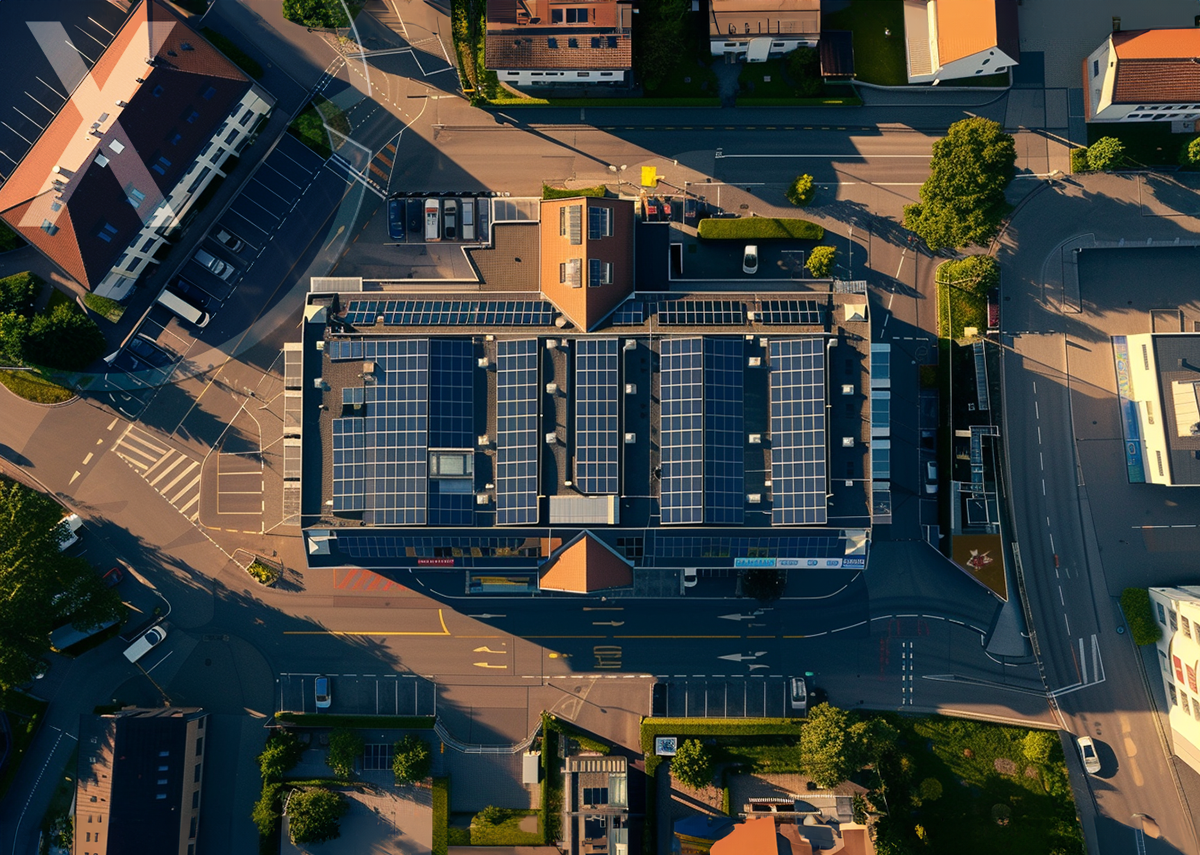
PV roofs in Bavaria: Only 10% of commercial properties have solar panels on supermarkets, industrial buildings and warehouses – Image: Xpert.Digital
🏬🌞 Commercial space in Bavaria: 90% of roofs remain unused!
🌍 The use of solar power systems in Bavaria
While solar panels on private homes are now widespread in Bavaria, the potential of supermarket, industrial building, and warehouse roofs remains largely untapped. Only about 10% of available commercial space is currently equipped with solar panels, meaning that 90% of potential areas remain unused.
Currently, only about ten percent of available commercial space is equipped with solar panels. This means that an enormous potential of 90 percent remains untapped. Compared to the market for single-family homes, however, installing solar panels on commercial buildings is significantly more complex.
🏢 Complex ownership structures
A major reason for this discrepancy lies in the ownership structure. In single-family homes, the building owner and the electricity consumer are usually the same person. In the commercial sector, the property often belongs to a real estate fund or investment company, while the manufacturing company or retailer only leases the building. Installing a solar system on the roof requires the owner's consent, as only they can enter into the relevant contract. This means that at least three parties—owner, tenant, and installer—need to be coordinated, which significantly complicates the process.
🛠️ Challenging planning and implementation
Planning and installing solar power systems on commercial buildings is often more complex than on private homes. Commercial buildings have different roof structures, structural requirements, and safety regulations that can complicate installation. Flat roofs of warehouses and supermarkets, for example, must be able to support the additional weight of the solar panels. Furthermore, the requirements for lightning protection and fire safety are higher, which means additional investment and planning effort.
⚡ Exhausted network capacities
Another major obstacle is the existing power grid. In many cases, large-scale installations cannot be connected to the grid because its capacity is already at its limit. Expanding the power grid is a lengthy process that can take up to ten years and involves extensive application and approval procedures as well as high costs. This deters many potential investors and significantly slows down the implementation of solar projects on commercial rooftops.
🏛️ Complex regulation and bureaucracy
Germany faces a complex situation with over 850 distribution network operators. Each of these operators interprets the application rules individually, which complicates the standardization of procedures. For companies, this means they have to deal with different requirements and processes depending on where their buildings are located. The bureaucratic hurdles should also not be underestimated. Approval procedures can be lengthy, and the requirements vary from state to state. Furthermore, technical inspections, structural analyses, and compliance with fire safety regulations can further delay the installation process.
💰 Financial aspects and profitability
Financial factors also play a crucial role. While private homeowners can benefit from government subsidy programs and feed-in tariffs, the financial incentives for commercial buildings are often less attractive. The investment costs for large solar installations are substantial, and profitability depends on many variable factors, including current electricity prices, subsidy conditions, and tax incentives. Furthermore, depreciation periods are longer, which reduces the willingness to invest.
🚫 Lack of incentives and awareness problems
Many companies focus on their core business and lack the resources and expertise to deal with the installation and operation of solar power systems. There is often a lack of awareness regarding the long-term benefits and opportunities offered by renewable energies. Without clear financial incentives or legal obligations, solar energy remains a secondary concern for many businesses.
🌟 Positive developments and solutions
Despite the challenges mentioned, there are also positive developments. Some companies are increasingly recognizing the advantages of solar energy and are investing in their own systems to save on energy costs in the long term and improve their carbon footprint. There are initiatives and projects aimed at promoting the installation of solar systems on commercial properties and removing existing obstacles.
One possible solution could lie in simplifying the permitting process. Uniform standards and clear guidelines could accelerate the process and make it more attractive. Financial incentives and special funding programs for commercial buildings could also increase the willingness to invest. Innovative business models such as Power Purchase Agreements (PPAs) allow companies to benefit from solar power without making their own investments. In this model, a service provider installs the system on the company's roof and sells the generated electricity directly to the user.
🤝 Cooperation between owners and tenants
Cooperation between owners and tenants is another key to unlocking the solar potential of commercial buildings. Tenant electricity models allow both parties to benefit from the installation of a solar system. The generated electricity is supplied directly to the tenants, saving costs and contributing to the achievement of sustainability goals.
🔍 Technological innovations
Technological advances could help overcome some of the existing challenges. Lighter and more flexible solar panels facilitate installation on various roof structures. Furthermore, energy storage systems can help relieve pressure on the grid by storing excess electricity on-site and using it when needed. The integration of smart grid technologies can also increase efficiency and optimize self-consumption.
😃 Solar power plants on commercial properties in Bavaria
The untapped potential for solar installations on commercial properties in Bavaria is enormous. However, to fully realize this potential, various obstacles must be overcome. Joint efforts from policymakers, businesses, and society are needed to create the necessary framework. Simplified permitting processes, financial incentives, and innovative business models could help promote the installation of solar panels on warehouses, supermarkets, and industrial buildings. Ultimately, this would not only contribute to the energy transition but also offer economic benefits for companies and property owners.
📣 Similar topics
- 🌞 Solar potential in Bavaria: Only 10% of commercial areas use solar energy!
- 🏢 Commerce and solar energy: A large untapped potential in Bavaria
- 📉 Only 10% of commercial properties in Bavaria are equipped with solar panels
- 🏬 Supermarkets and warehouses: Why does the solar potential remain untapped?
- ⚙️ Complex structures: Challenges in installing solar systems on commercial buildings
- 🚧 Bureaucracy and regulation: Hurdles for solar power systems on commercial properties in Germany
- 💡 Positive developments: Companies are increasingly investing in solar energy
- 📊 Financial incentives and solar energy: Why are they missing in commercial real estate?
- 🤝 Cooperation between owners and tenants: Tenant electricity models as a solution?
- 🛠 Technological innovations: Opportunities for using solar power systems on commercial properties
#️⃣ Hashtags: #SolarEnergy #CommercialSpace #Bavaria #Sustainability #EnergyTransition
We are there for you - advice - planning - implementation - project management
☑️ Industry expert, here with his own Xpert.Digital industry hub with over 2,500 specialist articles
I would be happy to serve as your personal advisor.
You can contact me by filling out the contact form below or simply call me on +49 89 89 674 804 (Munich) .
I'm looking forward to our joint project.
Xpert.Digital - Konrad Wolfenstein
Xpert.Digital is a hub for industry with a focus on digitalization, mechanical engineering, logistics/intralogistics and photovoltaics.
With our 360° business development solution, we support well-known companies from new business to after sales.
Market intelligence, smarketing, marketing automation, content development, PR, mail campaigns, personalized social media and lead nurturing are part of our digital tools.
You can find out more at: www.xpert.digital - www.xpert.solar - www.xpert.plus

